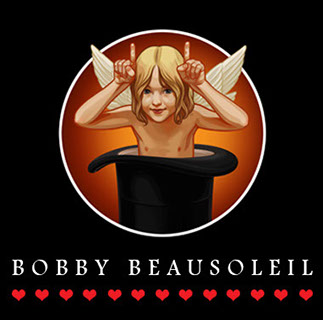![]()
A Sacred Partnership
![]()
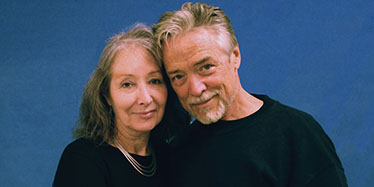
A Conversation with Barbara Beausoleil
by Michael Boss
Was originally published online for Black Magazin.
Could you describe how you came in contact with Bobby and which ways led you both from the first meeting to marriage?
The first time I saw Bobby was on television. It was a local news program from the Stockton/Sacramento area of California. The reporter was interviewing a man in prison who had designed and built a synthesizer in prison. I was intrigued. I called the television station, got his address and wrote him a letter. This was early September 1981. We corresponded for several weeks and then we began talking on the phone. I went to the prison to meet him in person for the first time in October. I began visiting once or twice a week and we continued speaking on the phone. In November I asked him to marry me and he accepted. We were married in December 1981.
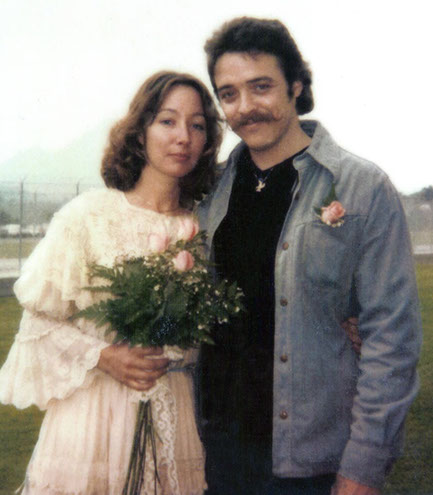 For me who is not in close contact to prisoners it is hard to imagine how a relationship through prison walls can work. So can you tell me something about your life as a married couple under these special and difficult circumstances?
For me who is not in close contact to prisoners it is hard to imagine how a relationship through prison walls can work. So can you tell me something about your life as a married couple under these special and difficult circumstances?
I think, in the beginning, the flush of love, we felt invincible. Then, as reality set in, I felt as if I had walked off a cliff. I had never been anywhere near a prison, much less inside one, before I met Bobby. Four months after we were married Bobby was stabbed. That was a very difficult time. We still barely knew each other and were waiting for our first “family” (conjugal) visit. I remember walking into the hospital room and seeing him lying in the bed with all sorts of tubes coming out of him. This was in the intensive care unit where they discouraged visiting by taking all the chairs out of the rooms. There was nowhere to sit, so I stood next to his bed, but my knees gave out and I knelt down to avoid fainting. The guard outside the doorway probably thought I was praying but I was just trying not to pass out. As soon as I took his hand, Bobby opened his eyes. He couldn’t speak because he had tubes down his throat but he smiled and squeezed my hand so solidly that I knew he was going to survive. He had been stabbed twice, puncturing his heart and both lungs. By the time the prison staff got him to the hospital he had lost so much blood that they opened him up from sternum to spine, in the emergency room, because there was not enough time to get him to the surgery unit. No one thought he would survive, but he did. A few months later we had our first conjugal visit. During the next several years we enjoyed these visits about every 6 months. We were able to spend 5 days alone together each year. In the early ‘90s, California took “family” visits away from all inmates who were serving life sentences. Ever since then we can only be together in the prison visiting room, sitting across a table from each other. We also talk on the phone several times a week.
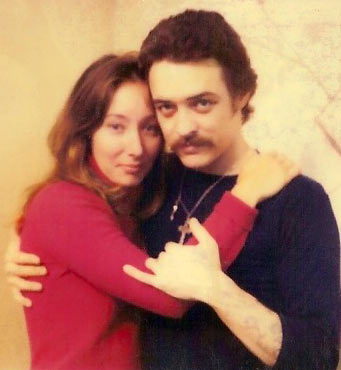 There have been times when I have questioned the wisdom of asking Bobby to marry me. Our marriage has lasted 29 years because our expectations have changed. In the beginning, when I first met him, Bobby had already been in prison for 12 years. Few people in California at that time served more than 15-20 years for similar crimes. The emphasis had been more on rehabilitation. But then the “tough on crime” fear tactics started to appear, generated mostly by politicians seeking election. Fear is such an effective tool for getting people riled up. Parole of lifers in California virtually halted for years which made the parole board useless. The hype of Bobby’s connection to Charles Manson has also been a factor in the parole board’s decisions. They bring it up a lot at his hearings. I think the whole Lucifer Rising thing may have triggered some negative feelings on the part of the parole board. There is a strong “Christian”- based fear in this country in regards to Lucifer. Most have accepted the Christianized version and have no knowledge of the original myth. Parole boards, district attorneys and media love to feed on anything that they can call a “cult.” It stimulates fear in people. I don’t know if Bobby will get out of prison in this lifetime. But I have come to trust that if we are meant to spend some time together, we will. I have accepted that I love this man, and I am his partner whether he gets out of prison or not. I have found it very liberating to detach from expectations.
There have been times when I have questioned the wisdom of asking Bobby to marry me. Our marriage has lasted 29 years because our expectations have changed. In the beginning, when I first met him, Bobby had already been in prison for 12 years. Few people in California at that time served more than 15-20 years for similar crimes. The emphasis had been more on rehabilitation. But then the “tough on crime” fear tactics started to appear, generated mostly by politicians seeking election. Fear is such an effective tool for getting people riled up. Parole of lifers in California virtually halted for years which made the parole board useless. The hype of Bobby’s connection to Charles Manson has also been a factor in the parole board’s decisions. They bring it up a lot at his hearings. I think the whole Lucifer Rising thing may have triggered some negative feelings on the part of the parole board. There is a strong “Christian”- based fear in this country in regards to Lucifer. Most have accepted the Christianized version and have no knowledge of the original myth. Parole boards, district attorneys and media love to feed on anything that they can call a “cult.” It stimulates fear in people. I don’t know if Bobby will get out of prison in this lifetime. But I have come to trust that if we are meant to spend some time together, we will. I have accepted that I love this man, and I am his partner whether he gets out of prison or not. I have found it very liberating to detach from expectations.
Your father was a Navy officer, and as a child you moved with your family from one Navy base to another (by the way, Jim Morrison lived a similar life during his childhood). How did this life form your character?
For most children of military families, being periodically uprooted is a way of life. This is especially disruptive and confusing when they enter school. For example, when I entered first grade at seven years old, we were living in Rhode Island, where cursive writing was taught in first grade. When I entered second grade a year later, we were living in Texas where children were taught to print in the first grade and didn’t learn cursive writing until they were 2 years older. And there’s the loss of friends when you move around a lot. Like many children of military families, I felt my main job was to fit in, wherever I was. I was quite shy as a child, so this often seemed like a daunting task that kept changing and repeating itself. Another aspect of military life that was difficult for children of my generation was the amount of alcohol consumed by our parents. Drinking was the main social, recreational activity, an accepted part of the culture. I don’t know if that has changed. I hope it has. Alcohol was a major disruptive factor in our family life. But the outcome was that I became much more adaptable to new situations than I probably would have, had I been raised in a more stable family environment. I believe it is a trait that has served me well. I am not easily intimidated by new or challenging situations. I think my intense love of “home” is a result as well. I have no great desire to travel. When I found my barn here in Oregon in 2001, I felt like I had finally arrived home.
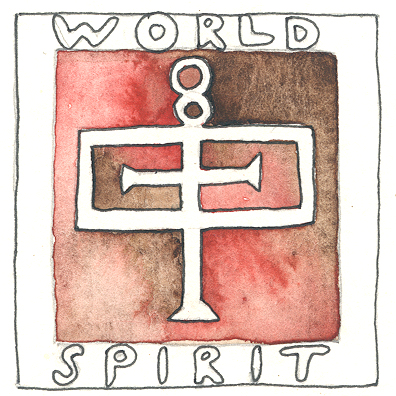 How close did you come into contact with the counterculture of the 60s, e.g. the authors of Beat Generation or the hippie movement, and who were the writers and artists you admire most?
How close did you come into contact with the counterculture of the 60s, e.g. the authors of Beat Generation or the hippie movement, and who were the writers and artists you admire most?
By the early 60s my father had left the Navy and our family had settled in the village of Woodstock. If all the disruption of the previous years resulted in our landing in Woodstock, it was worth it. Woodstock is a beautiful village in the Catskill mountains in upstate New York. This is where I started to feel a strong connection to Nature and the creative spirit. Woodstock was home to many artists, writers and musicians. These were creative, forward thinking people – explorers of consciousness. We had beatniks in the early days. They seemed to morph, for the most part, into the “hippies” of the later ‘60s. We were all experimenting with alcohol alternatives – pot, acid, etc. It was an amazing time between childhood and adulthood when all things were possible. I graduated from high school in 1965 and left Boston University in ’69. The Viet Nam war was raging. Those experimenting with consciousness altering drugs were part of the “anti-war” movement. The situation in this country at that time was hair-trigger explosive. Our own National Guard were shooting and killing unarmed students on college campuses, hundreds of thousands dying in Viet Nam, American cities bombed by our own law enforcement. Through all of this, we were experimenting with some pretty heavy mind-altering drugs. Our expressions of disapproval and resistance to the status quo were met with knee-jerk fear and backlash on the part of our society that was still stuck in the ‘50s.
I don’t remember doing much reading during this period. I began Magister Ludi several times, but I never finished it. I think this was an unconscious choice after having to read so much at school and university. But art was all around me. And the folk music scene was big. I t was not uncommon to see Bob Dylan or Joan Baez at the local café. I also loved the music I had been exposed to in Boston and across the river in Cambridge. Club 47 was a popular place to see live music, like Jim Kweskin, the Muldaurs, Spider John Koerner, Leon Russell, Dave Van Ronk, Richard and Mimi Farina. I loved the folk scene but I’ve always been drawn to rhythm and blues. I remember seeing Chuck Berry at a wild concert at MIT and I loved Paul Butterfield. There were several art galleries in Woodstock, so there was never a shortage of art to see. But I think the paintings I enjoyed most were the beautiful landscapes that hung on the walls of the homes of my friends. Chase, Pike, Carlson are the names that come to mind.
What were the reasons for your decision to study painting and become an artist?
Living in Woodstock was a major factor in my decision to become an artist. Also, my mother was an artist although she never pursued it as a career or profession. She was naturally artistic. I have some of her art and I cherish it. Her appreciation for art was a big influence on me. She is also the one who turned me on to dancing and music.
What are the inspirations for your paintings and what are your favorite topics you deal with?
Mythology and Nature are my main inspirations. The idea of being able to portray movement in a painting also inspires me. I am just finishing a series of paintings for an art show entitled “Dancers & Drummers”. Some of these paintings can be seen on Goddess Gallery site.
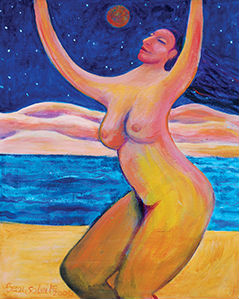
One important part of your work is the exploration of the myth of the Mother Goddess. How did you discover this fascinating topic and what means it to you personally?
I became aware of the Goddess movement in the early ‘80s. I heard a radio program with women discussing the work of Starhawk, Riane Eisler and others. That’s when something in my heart clicked. I was not raised in a religious family. As a child I was free to explore in that regard. But I never connected on a heart level with any of the Judeo-Christian religious views I came in contact with. In my teens I loved learning about Greek, Roman and Egyptian mythologies. The work of Joseph Campbell came later and I’ve been a student of world mythologies ever since. I gradually became aware of the fact that there were times on the planet when many of us prayed to the Goddess. This made sense to me. All the things I love about being alive – Nature, music, dance, poetry, art – are expressions of the Goddess. I came to realize that by taking human form on this planet I have embarked on a relationship with Mother Earth.
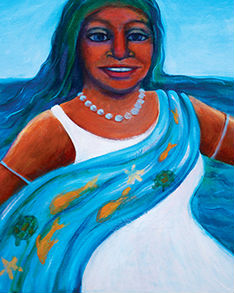
Do you think a revival of worshiping the Mother Goddess with all the principles connected to her will be one way to solve the dramatic problems humanity is confronted with and which is rooted in the patriarchal structure of our culture and the dominance of monotheistic religions and their values?
I believe Judeo/Christian/Islamic religious dominance is at the root of many of our planet’s problems. Any spiritual practice that excludes the female aspect of Creator is not functioning at the level of divine source. This is main reason created the Mother Goddess website. I believe our species is at a crossroad. If we continue along the path we’ve been on, we will come to an evolutionary dead end. We’ve been destroying our own habitat for a long time. What is more suicidal than that? Our species’ continuing evolution on this planet depends on how many of us can make the leap of consciousness that is required.
What do you think about special pagan cults worshiping the Great Goddess, e. g. Wicca?
I don’t think I would describe Wicca as a “special pagan cult.” To me, real Wicca is about consciously reconnecting to Nature. If I were to call myself a Wiccan, I would describe myself as “solitary practitioner” to use the words of one of my favorite authors on the subject, Scott Cunningham.
What is the character of your religious beliefs and do you practice a special kind of 'cult'?
The word “cult” implies dogma and I am anti-dogma in all it’s forms. So I am not a practitioner or follower of any religion or cult.
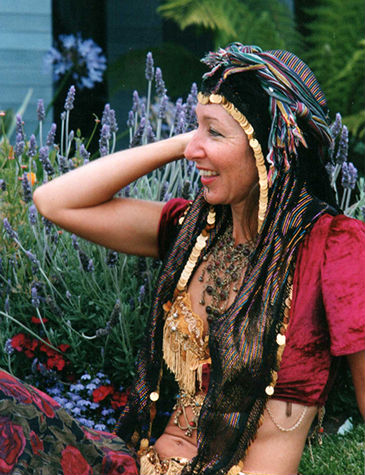 How did you discover your fascination for Middle Eastern dancing and what does it mean for you today?
How did you discover your fascination for Middle Eastern dancing and what does it mean for you today?
I became interested in Middle Eastern dance after my third child was born, in the early 70s. I loved the movements I was learning but I never felt comfortable with the cabaret –style of bellydance, which typically involved a single dancer performing in front of an audience in a scanty, sequined costume. It wasn’t until I was living in California in the early 90s when I discovered “American Tribal-style” bellydance. I danced with Raks al Beledi and Raks Alat in the San Luis Obispo area. The style of dance we do now with Raks Sarama isa combination of belly dance and folk dance. We learn choreography and dance in a group. There is a great connection that takes place when you dance with a group. Waves of energy are generated that can't be accomplished by a single dancer. The whole becomes more than the sum of it's parts.
In 1992 you formed your own troupe Raks Sarama. Please tell me something about the concept behind this group, its work and upcoming shows and projects.
Raks Sarama was formed in 2003 after I moved from California to Oregon. I began teaching classes at my studio, at the local community college, and in a nearby town at a friend’s place. Several of my advanced students expressed their desire to form a troupe, and were willing to put in the time required. Initially, we just danced for ourselves. Then gradually we started performing at local fairs, weddings, birthdays, etc. Soon after we started performing I made the decision that our troupe would not perform to canned music. We would only perform with live music. So several of the husband’s of our dancers stepped up and learned some basic Middle Eastern drum rhythms and that’s when Raks Sarama was really born. We are the official dance troupe of the Shrewsbury Rennaissance Fair here in Kings Valley, as well as our more local Canterbuy Festival. We regularly perform at the Fine Arts Festival in Silverton, Oregon and for the Multi-cultural Day Celebration. Our performance schedule usually slows down in the winter. This is when we work on new choreography and music. We are in the process of adding various melodic instruments to the band.
Do you use some of Bobby's music for your own dance performances?
I have choreographed to some of Bobby’s music. I’m working on dances to “Island Girl” and “Tar Pit” from his “7” album. Also, another of my dances called “Bobby Ganesh” was inspired by Bobby. We haven’t performed to his music yet because, as I said, we don’t perform to recorded music.
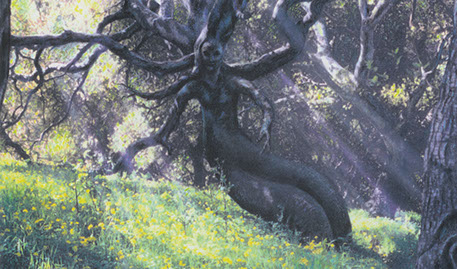 How close are yours and Bobby's processes of creative working connected?
How close are yours and Bobby's processes of creative working connected?
Bobby and I have worked together on many projects over the years. We designed and created our websites together. With White Dog Music, Bobby is the main creative participant. I take care of the nuts-and-bolts part of the business – filling orders, typing correspondence, etc. Mother Goddess and Sisters Bizar are my babies. The design of our studio was also a collaboration.
What are your plans for the future and what upcoming projects you working on?
I’m working on new dances for next season. I’d like to play more with the music, bring in new instruments – perhaps translate some of Bobby’s melodies to acoustic instruments for Raks Sarama. Painting is an on-going activity.
I am also an avid gardener and knitter so I have many projects involving vegetable gardens, fruit trees, flowers, sweaters and socks! We have three grandchildren, all of whom are delightful and talented. Alas, they all live a long distance from here and we don’t see them as often as we’d like. We are also awaiting the arrival of our fourth grandchild, whose parents live close by so we will be able to spend more time together. Finally, a playmate!
Text © Michael Boss. May not be reproduced without permission.
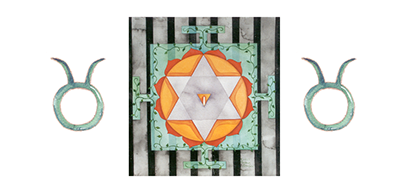
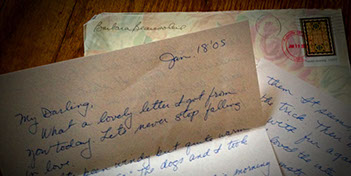
Barbara's Letter to Bobby
January 18, 2005
My Darling,
What a lovely letter I got from you today. Let's never stop falling in love.
It's been windy but quite warm today - over 50 degrees. The dogs and I took a little walk.
I heard a story on NPR this morning about the California prison system and how the new head of the Dept. of Corrections, who used to be the warden at San Quentin, is into rehabilitation rather than punishment. Did you hear it? It was very encouraging.
It almost felt like Spring out today. I told the plants not to be fooled by this unseasonably warm weather - we'll be having more cold before Spring is really here. I love Oregon weather. We have a real winter but it isn't unendurably long. It starts later and ends earlier than in New England which makes it more enjoyable. But I am looking forward to digging in the garden and seeing the daffodils and irises.
I'm looking forward to seeing your new artwork. "Electric Boy" sounds intriguing. Is it a self-portrait?
My shoulder is feeling better but it's still sore. I've managed to get a good nights sleep the last couple of nights and its made a world of difference.
Mali and Chloe have had a skin condition - itchy hot spots. I tried everything I could think of, bought various sprays and treatments - to no avail. About a week ago, I picked up some Gold Bond ointment and have been putting it on them. It seems to finally, to be doing the the trick. Their bald spots are filling in with fur again.
I loved the intention you wrote about being the instrument of healing for my wounds concerning men. I believe it was this that first drew me to you. I had a sense, way back then, that you were the only man who could do that. I still believe this. And it's happening, my love. It doesn't come without pain - like childbirth - but I believe and it is my intention that our love, yours and mine, will raise the vibration of our whole species (which is in dire need of it). It is my intention to set this example with you. To be the living manifestation of transformative love, trust and forgiveness. In truth, this is already a done deal. But you are correct that it is a good thing to write about this to each other. It is my intention to be totally connected with you, my beloved. Yab yum.
You say you can be patient and you will wait for as long as it takes. What is it that you are waiting for? What you desire you already have. We will make wonderful music together, my love. You will hold me close and whisper that you love me. And I will teach you to dance.
All my love,
Barbara
Moksha
Una notte a California, con la luna e il mare
Ho in contrato un angelo, che non poteva pin volar
Una notte a California, delle stelle si scordo
E anche Senza ali, In Cielo mi porto.
©2014 Beth Hall | Images and text are copyrighted to their respective owners
